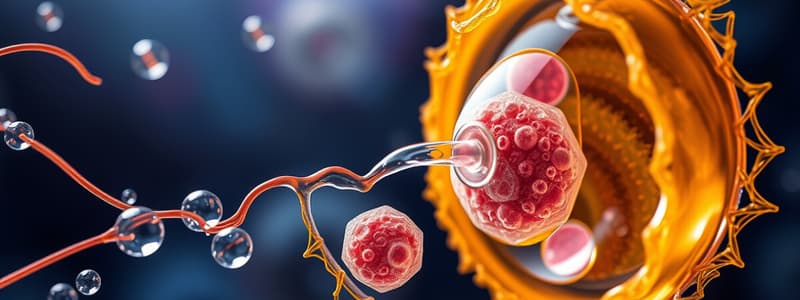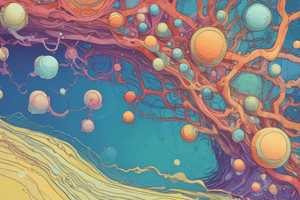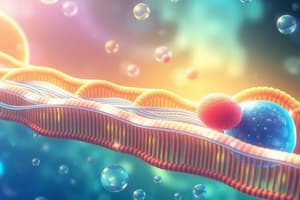Podcast
Questions and Answers
What is the primary purpose of the Synthesis (S) phase in the cell cycle?
What is the primary purpose of the Synthesis (S) phase in the cell cycle?
- To prepare the cell for division
- To undergo cytoplasmic division
- To facilitate cellular respiration
- To copy the DNA (correct)
Which of the following statements correctly describes mitosis?
Which of the following statements correctly describes mitosis?
- It occurs only in gametes.
- It results in two cells with equal DNA as the parent. (correct)
- It involves a process of reductional division.
- It produces 4 haploid cells.
What happens during Gap 1 (G1) phase of the cell cycle?
What happens during Gap 1 (G1) phase of the cell cycle?
- The cell divides its nucleus.
- The cytoplasm is divided.
- The cell undergoes significant growth. (correct)
- The DNA is synthesized.
Which process is associated with a reduction in chromosome number?
Which process is associated with a reduction in chromosome number?
During which phase of the cell cycle does the cell prepare to divide its cytoplasm?
During which phase of the cell cycle does the cell prepare to divide its cytoplasm?
What happens immediately after nuclear division?
What happens immediately after nuclear division?
During which stage of mitosis do chromosomes align at the center of the cell?
During which stage of mitosis do chromosomes align at the center of the cell?
What is the role of spindle fibers during cell division?
What is the role of spindle fibers during cell division?
What characterizes the anaphase stage of mitosis?
What characterizes the anaphase stage of mitosis?
Which cellular structure is actively forming during prophase?
Which cellular structure is actively forming during prophase?
What is the outcome of meiosis?
What is the outcome of meiosis?
What structure begins to form in animal cells during cytokinesis?
What structure begins to form in animal cells during cytokinesis?
Which phase of interphase is characterized by DNA synthesis?
Which phase of interphase is characterized by DNA synthesis?
Flashcards are hidden until you start studying
Study Notes
Cell Transport Mechanisms
- Digests and removes substances outside the cell through various processes.
- Movement occurs from high to low concentration without the use of energy, utilizing transport proteins.
- Osmosis is the movement of water from low salt (high water) to high salt (low water) areas.
- Cells can experience osmotic pressure changes, leading to swelling (burst) or shrinking depending on the surrounding environment.
Cell Reproduction
- The cell cycle consists of stages that a eukaryotic cell undergoes between two divisions.
Interphase
- Known as the "Resting Stage," it includes three phases:
- G1 Phase: Initial growth phase.
- S Phase: Critical stage where DNA replication occurs.
- G2 Phase: Final growth phase before division.
Mitosis and Meiosis
- Mitosis results in two identical diploid (2n) cells, primarily involving somatic cells.
- Meiosis produces four unidentical haploid (n) cells, associated with gametes in animals and spores in plants.
Stages of Mitosis
- Karyokinesis (Nuclear Division): Subdivided into phases:
- Prophase: Nuclear membrane disintegrates; chromosomes condense; formation of spindle fibers begins.
- Metaphase: Chromosomes align at the cell equator with spindle poles at opposite ends.
- Anaphase: Sister chromatids separate and move toward opposite poles; cytokinesis starts with cleavage furrow in animals and cell wall in plants.
- Telophase: Nuclear membrane reforms; chromosomes de-condense back to interphase state.
Cytokinesis
- Occurs right after mitosis, enabling the physical division of the cytoplasm and organelles.
Meiosis
- A reductional division that helps maintain constant chromosome numbers across generations.
- Involves fertilization, where sperm and egg fuse to create a diploid zygote.
- Introduces genetic variability that enhances survival prospects in changing environments.
Studying That Suits You
Use AI to generate personalized quizzes and flashcards to suit your learning preferences.




